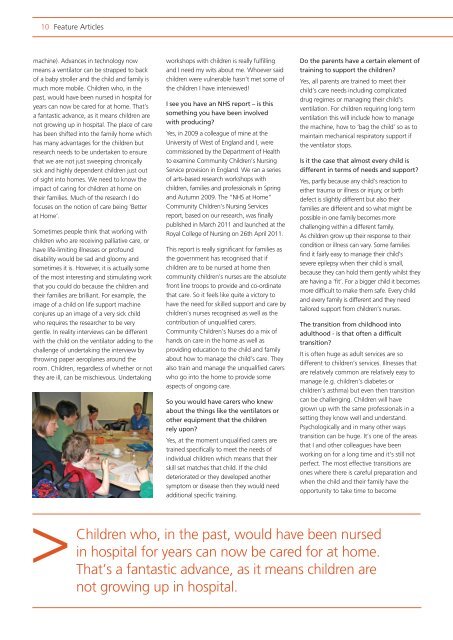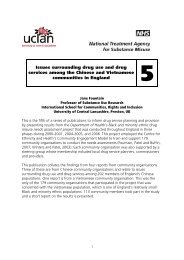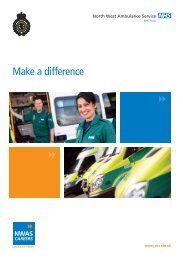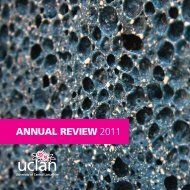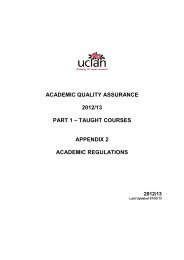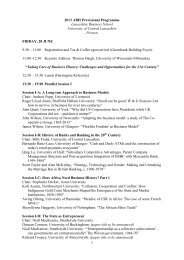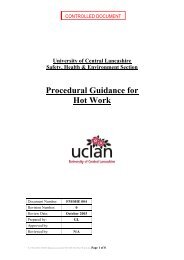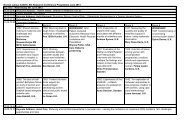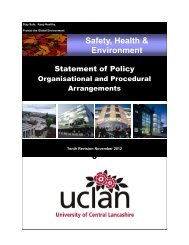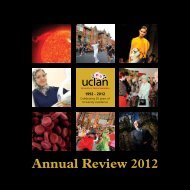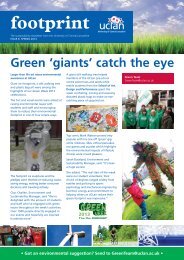Autumn 2011 Issue - University of Central Lancashire
Autumn 2011 Issue - University of Central Lancashire
Autumn 2011 Issue - University of Central Lancashire
You also want an ePaper? Increase the reach of your titles
YUMPU automatically turns print PDFs into web optimized ePapers that Google loves.
10 Feature Articles<br />
machine). Advances in technology now<br />
means a ventilator can be strapped to back<br />
<strong>of</strong> a baby stroller and the child and family is<br />
much more mobile. Children who, in the<br />
past, would have been nursed in hospital for<br />
years can now be cared for at home. That’s<br />
a fantastic advance, as it means children are<br />
not growing up in hospital. The place <strong>of</strong> care<br />
has been shifted into the family home which<br />
has many advantages for the children but<br />
research needs to be undertaken to ensure<br />
that we are not just sweeping chronically<br />
sick and highly dependent children just out<br />
<strong>of</strong> sight into homes. We need to know the<br />
impact <strong>of</strong> caring for children at home on<br />
their families. Much <strong>of</strong> the research I do<br />
focuses on the notion <strong>of</strong> care being ‘Better<br />
at Home’.<br />
Sometimes people think that working with<br />
children who are receiving palliative care, or<br />
have life-limiting illnesses or pr<strong>of</strong>ound<br />
disability would be sad and gloomy and<br />
sometimes it is. However, it is actually some<br />
<strong>of</strong> the most interesting and stimulating work<br />
that you could do because the children and<br />
their families are brilliant. For example, the<br />
image <strong>of</strong> a child on life support machine<br />
conjures up an image <strong>of</strong> a very sick child<br />
who requires the researcher to be very<br />
gentle. In reality interviews can be different<br />
with the child on the ventilator adding to the<br />
challenge <strong>of</strong> undertaking the interview by<br />
throwing paper aeroplanes around the<br />
room. Children, regardless <strong>of</strong> whether or not<br />
they are ill, can be mischievous. Undertaking<br />
workshops with children is really fulfilling<br />
and I need my wits about me. Whoever said<br />
children were vulnerable hasn’t met some <strong>of</strong><br />
the children I have interviewed!<br />
I see you have an NHS report – is this<br />
something you have been involved<br />
with producing?<br />
Yes, in 2009 a colleague <strong>of</strong> mine at the<br />
<strong>University</strong> <strong>of</strong> West <strong>of</strong> England and I, were<br />
commissioned by the Department <strong>of</strong> Health<br />
to examine Community Children’s Nursing<br />
Service provision in England. We ran a series<br />
<strong>of</strong> arts-based research workshops with<br />
children, families and pr<strong>of</strong>essionals in Spring<br />
and <strong>Autumn</strong> 2009. The “NHS at Home”<br />
Community Children’s Nursing Services<br />
report, based on our research, was finally<br />
published in March <strong>2011</strong> and launched at the<br />
Royal College <strong>of</strong> Nursing on 26th April <strong>2011</strong>.<br />
This report is really significant for families as<br />
the government has recognised that if<br />
children are to be nursed at home then<br />
community children’s nurses are the absolute<br />
front line troops to provide and co-ordinate<br />
that care. So it feels like quite a victory to<br />
have the need for skilled support and care by<br />
children’s nurses recognised as well as the<br />
contribution <strong>of</strong> unqualified carers.<br />
Community Children’s Nurses do a mix <strong>of</strong><br />
hands on care in the home as well as<br />
providing education to the child and family<br />
about how to manage the child’s care. They<br />
also train and manage the unqualified carers<br />
who go into the home to provide some<br />
aspects <strong>of</strong> ongoing care.<br />
So you would have carers who knew<br />
about the things like the ventilators or<br />
other equipment that the children<br />
rely upon?<br />
Yes, at the moment unqualified carers are<br />
trained specifically to meet the needs <strong>of</strong><br />
individual children which means that their<br />
skill set matches that child. If the child<br />
deteriorated or they developed another<br />
symptom or disease then they would need<br />
additional specific training.<br />
Do the parents have a certain element <strong>of</strong><br />
training to support the children?<br />
Yes, all parents are trained to meet their<br />
child’s care needs including complicated<br />
drug regimes or managing their child’s<br />
ventilation. For children requiring long term<br />
ventilation this will include how to manage<br />
the machine, how to ‘bag the child’ so as to<br />
maintain mechanical respiratory support if<br />
the ventilator stops.<br />
Is it the case that almost every child is<br />
different in terms <strong>of</strong> needs and support?<br />
Yes, partly because any child’s reaction to<br />
either trauma or illness or injury, or birth<br />
defect is slightly different but also their<br />
families are different and so what might be<br />
possible in one family becomes more<br />
challenging within a different family.<br />
As children grow up their response to their<br />
condition or illness can vary. Some families<br />
find it fairly easy to manage their child’s<br />
severe epilepsy when their child is small,<br />
because they can hold them gently whilst they<br />
are having a ‘fit’. For a bigger child it becomes<br />
more difficult to make them safe. Every child<br />
and every family is different and they need<br />
tailored support from children’s nurses.<br />
The transition from childhood into<br />
adulthood - is that <strong>of</strong>ten a difficult<br />
transition?<br />
It is <strong>of</strong>ten huge as adult services are so<br />
different to children’s services. Illnesses that<br />
are relatively common are relatively easy to<br />
manage (e.g. children’s diabetes or<br />
children’s asthma) but even then transition<br />
can be challenging. Children will have<br />
grown up with the same pr<strong>of</strong>essionals in a<br />
setting they know well and understand.<br />
Psychologically and in many other ways<br />
transition can be huge. It’s one <strong>of</strong> the areas<br />
that I and other colleagues have been<br />
working on for a long time and it’s still not<br />
perfect. The most effective transitions are<br />
ones where there is careful preparation and<br />
when the child and their family have the<br />
opportunity to take time to become<br />
><br />
Children who, in the past, would have been nursed<br />
in hospital for years can now be cared for at home.<br />
That’s a fantastic advance, as it means children are<br />
not growing up in hospital.


